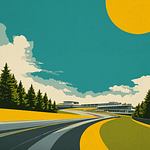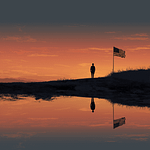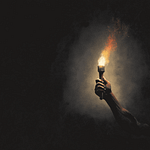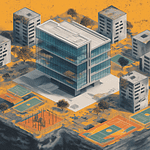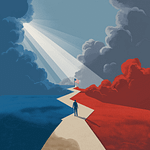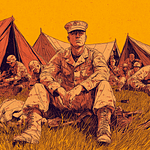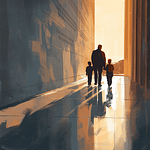Every so often, a question finds you—not to be answered, but to be carried. I came across one recently, shared by a friend online. It was simple in form but endlessly complex in implication:
What is a country?
I’ve asked myself that same question more times than I can count. Not out of cynicism, but out of genuine curiosity. I’ve tried to define it in terms of borders, laws, culture, and history—but none of those answers have ever felt whole. None have satisfied the deeper ache for truth or the mystery that lingers when you consider what a country really is—not on paper, but in the soul.
The best I can tell you is this: a country is both incredibly meaningful and altogether ridiculous at the same time.
At its core, a country is a collective agreement. A belief system. A story that enough people agree to believe in. We draw lines on the land, invent symbols, write anthems, and crown leaders. We build systems to govern behavior, manage resources, and protect what we call “ours.” And then we teach those systems to our children as if they’ve always been there. As if they’re natural. As if they’re not just something we made up.
And yet, the concept of a country is one of the most profound accomplishments in human history.
You have to admire the audacity of it: the idea that millions—sometimes hundreds of millions—of individuals who will never meet, who speak different languages and live wildly different lives, can be bound together under a single idea. That’s the real magic. A country is not just geography or governance. It is a shared sense of belonging among strangers. It’s an exercise in collective myth-making. And in many ways, that myth is what gives it power.
But let’s not forget how we got here.
Human beings didn’t start with nations. We started with tribes. We gathered in small groups, not because it was fashionable or ideological, but because it was necessary. We hunted together. We farmed together. We raised our children in clusters and protected each other from the cold and from predators. That’s what made us different from every other species. We were not the strongest or the fastest. But we were the best at organizing, the best at cooperation. And over time, that cooperation scaled.
Families became villages. Villages became towns. Towns became cities. Cities became civilizations. And those civilizations, in time, began to define themselves as nations—each with its own rules, its own banners, its own vision of what it meant to belong.
That progression is beautiful. It’s a testament to what human beings can accomplish when we act in concert. A country, in that light, is an evolved form of community. It’s our attempt to formalize the very thing that helped us survive.
But like all things born of necessity, the purpose has drifted.
What once was a tool for survival has become a symbol of dominance. Today, the concept of a nation is often less about mutual protection and more about mutual exclusion. We use our flags not just to unite ourselves, but to distinguish ourselves from others. We draw hard lines between “us” and “them.” We measure the value of our identity by how it performs on the world stage—economically, militarily, technologically. Nationalism becomes a scoreboard.
We’ve turned something that was once about coming together into something that can just as easily be used to pull us apart.
That’s the part I struggle with. Because I do believe in countries. I believe in the idea of having a flag to stand under, a community to contribute to, a story to be a part of. I believe that patriotism, when rooted in love and service, can be a force for good. It can inspire sacrifice. It can give people a sense of purpose. It can knit together generations who’ve never met, through a shared thread of hope and progress.
But I also believe this: that love must be held in balance with perspective.
Because when you zoom out far enough—past the cities, the states, the continents—you realize something humbling: the Earth doesn’t recognize our borders. The oceans don’t observe our trade agreements. The stars don’t pledge allegiance to any flag. And when the sun rises, it does so without regard for who is winning the global race.
We are all, quite literally, in this together. One species. One planet. One improbable miracle of existence spinning through a mostly lifeless universe.
In that context, some of our behaviors start to look a little absurd. We invent reasons to divide ourselves. We hoard resources that were never really “ours” to begin with. We fight wars over imaginary lines drawn by men who are long dead. We deny entry to strangers whose only crime is being born on the wrong side of a made-up map. We wave our flags with such fury that we forget how fragile the whole thing is.
And yet—here’s the paradox—I wouldn’t want to live in a world without countries. Because a world without structure is not utopia. It’s chaos. We need organization. We need shared stories. We need something to belong to. We need, quite simply, a place to call home.
So maybe the answer isn’t to reject the concept of a country, but to renew it. To remember that its original purpose was mutual flourishing, not competitive posturing. That its power lies not in its dominance, but in its ability to organize people around something greater than themselves.
Maybe a country is at its best when it doesn’t pretend to be eternal, but instead serves as a steward for the lives it holds. Maybe a country is strongest not when it builds walls, but when it builds trust. Not when it proclaims its greatness, but when it lives up to it.
And maybe, just maybe, the highest form of patriotism is recognizing that our country is just one thread in the fabric of humanity—and that our truest allegiance is to the planet, to each other, and to the delicate gift of life itself.
So, what is a country?
A contradiction.
A construct.
A community.
A miracle.
And most of all, a choice.
Let’s choose wisely.
If this episode gave you something to think about—if it challenged your assumptions or reminded you of what we’re capable of when we act in unity—consider subscribing on Substack, Apple Podcasts, or Spotify. I post new reflections nearly every weekday, and I hope they help you feel more anchored, more inspired, and more ready to lead a life that matters.
And if today’s message stirred something in you, here’s the challenge: reflect on your own sense of identity, community, and responsibility. Recommit to building a version of your country—or your community—that invites people in, not pushes them away.
Because in the end, countries are just stories we agree to believe in.
Let’s write better ones—together.
Until next time, be bold, be kind, and live like we all share the same sky.



